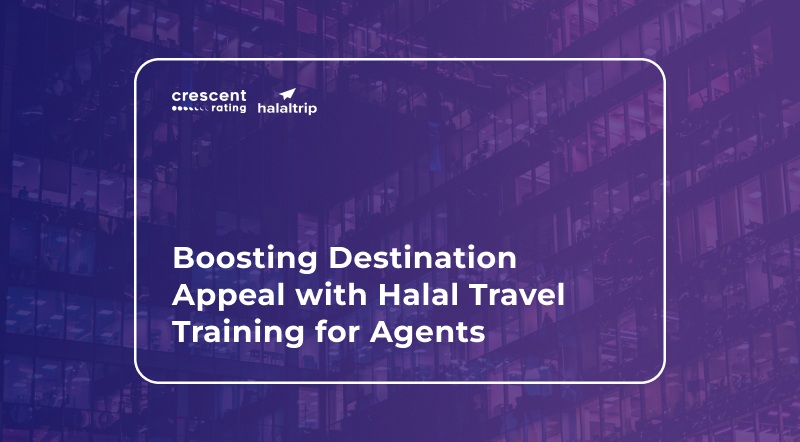
As destinations compete to attract Muslim travelers, offering halal food options or prayer facilities is no longer enough. To build a true appeal, destinations must empower their travel agents to deeply understand and engage with Muslim travelers' needs, preferences, and cultural considerations. Specialized training on the dynamics of halal tourism provides travel agents with the skills and knowledge to not only meet but also anticipate the needs of Muslim travelers.
The halal tourism market, which includes Muslim travelers seeking products and services aligned with Islamic principles, is projected to grow rapidly in the coming years. This shift makes a strong case for training travel agents to engage with this market effectively. Today, halal tourism is about offering halal food options and encompasses broader requirements, including privacy, courtesy, and family-friendly services. By investing in targeted training, destinations empower travel agents to become ambassadors of halal tourism, making them more accessible and attractive to Muslim visitors.
At the heart of effective engagement with Muslim travelers is cultural awareness. Understanding the practices, values, and expectations that can shape the Muslim traveler experience is critical to building trust. Training modules focusing on cultural sensitivity can equip agents with insights into daily practices, such as prayer schedules or halal food requirements, so agents can respectfully provide advice and answers. Cultural sensitivity training also creates welcoming environments that respect Islamic needs and values so Muslim travelers feel valued and cared for. This culturally respectful and understanding approach significantly increases customer satisfaction and contributes to a positive image of the destination as inclusive and welcoming to different cultural backgrounds. This helps strengthen the loyalty of Muslim travelers and opens up opportunities for the destination to reach a wider travel market.
A core aspect of halal training is to equip agents to identify and promote halal-friendly facilities in tourist destinations. This includes knowledge of halal-certified restaurants, prayer rooms, and gender-segregated facilities such as swimming pools and spas. Travel agents trained in this area can confidently guide Muslim travelers to these options, ensuring a smooth and welcoming experience. The goal is for travelers to feel confident that their needs are met without compromising faith-based requirements. By allowing agents to recommend these options, destinations can enhance their reputations as fully halal-compliant.
While halal-certified food is a priority, understanding the diversity in halal cuisine can enhance personalization. Training can teach agents about halal dining experiences, from fine dining restaurants to casual, family-friendly eateries. Some travelers may seek quick access to local halal street food, while others prefer high-end halal-certified eateries. Tailoring dining recommendations to different tastes within the halal framework will strengthen the destination's personalized approach to halal tourism.
Accurate information is essential when choosing a travel destination for Muslim travelers. Travel agents should be prepared to answer questions about halal certification, the availability of prayer rooms, and alcohol-free environments. Training should emphasize transparency and accuracy so that agents provide clear, reliable information that allows travelers to make informed decisions. In cases where options may be limited, training should equip agents to offer suitable alternatives and explain the differences honestly to foster trust and respect for Muslim travelers.
Muslim travelers often have specific questions about their trip, such as whether hotel restaurants serve halal food or local attractions are family-friendly. The training modules can cover frequently asked questions and potential misconceptions so that agents can prepare answers that comply with Islamic guidelines. This kind of preparedness demonstrates professionalism and care, reducing travelers' stress and increasing their comfort at their destination.
In today's competitive tourism landscape, destinations need differentiated selling points to capture new markets and drive growth. By investing in halal travel training for agents, destinations can position themselves as pioneers in catering to the growing Muslim travel market. This training differentiates the destination and reflects its commitment to inclusivity and respect for culture. As more destinations realize the importance of halal tourism, those with knowledgeable and culturally sensitive agents will become the first choice for Muslim travelers, giving them a greater advantage.
Training travel agents on the dynamics of halal tourism is a strategic move for destinations looking to increase their appeal in the Muslim tourism segment. Through cultural sensitivity, a deep understanding of halal requirements, and the ability to create personalized experiences, travel agents can act as effective ambassadors, increasing satisfaction and trust among Muslim travelers. These investments build long-term relationships, attract new visitors, and reinforce the destination's reputation as a diverse and welcoming location. For destinations looking to capture a loyal and growing market, prioritizing halal travel training for agents is a step towards sustainable success and increased global competitiveness. As halal tourism grows, training programs provide the essential knowledge agents need to ensure memorable and respectful experiences for Muslim travelers.
For more insights on empowering agents to engage with Muslim travelers, explore CrescentRating's Halal Travel Training Guide and discover how cultural awareness can elevate service and build trust in Muslim travelers.